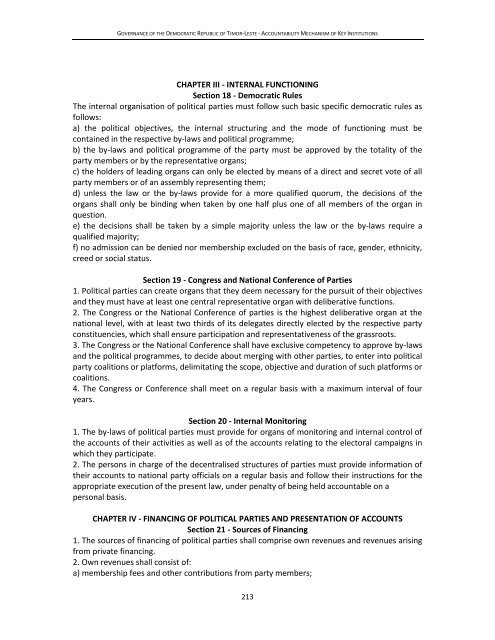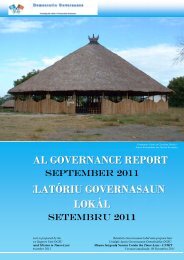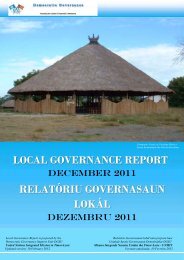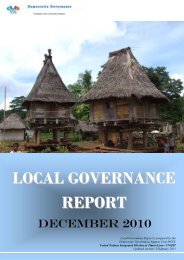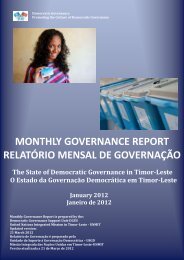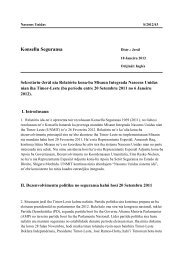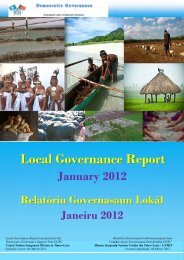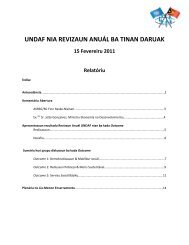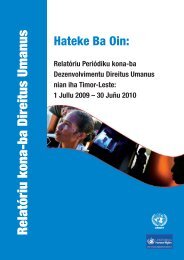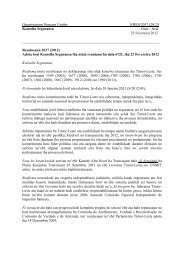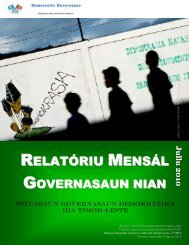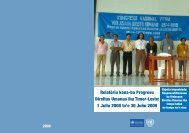Key Institutions Report final 15 December 2011 - Unmit
Key Institutions Report final 15 December 2011 - Unmit
Key Institutions Report final 15 December 2011 - Unmit
Create successful ePaper yourself
Turn your PDF publications into a flip-book with our unique Google optimized e-Paper software.
GOVERNANCE OF THE DEMOCRATIC REPUBLIC OF TIMOR-LESTE - ACCOUNTABILITY MECHANISM OF KEY INSTITUTIONS<br />
CHAPTER III - INTERNAL FUNCTIONING<br />
Section 18 - Democratic Rules<br />
The internal organisation of political parties must follow such basic specific democratic rules as<br />
follows:<br />
a) the political objectives, the internal structuring and the mode of functioning must be<br />
contained in the respective by-laws and political programme;<br />
b) the by-laws and political programme of the party must be approved by the totality of the<br />
party members or by the representative organs;<br />
c) the holders of leading organs can only be elected by means of a direct and secret vote of all<br />
party members or of an assembly representing them;<br />
d) unless the law or the by-laws provide for a more qualified quorum, the decisions of the<br />
organs shall only be binding when taken by one half plus one of all members of the organ in<br />
question.<br />
e) the decisions shall be taken by a simple majority unless the law or the by-laws require a<br />
qualified majority;<br />
f) no admission can be denied nor membership excluded on the basis of race, gender, ethnicity,<br />
creed or social status.<br />
Section 19 - Congress and National Conference of Parties<br />
1. Political parties can create organs that they deem necessary for the pursuit of their objectives<br />
and they must have at least one central representative organ with deliberative functions.<br />
2. The Congress or the National Conference of parties is the highest deliberative organ at the<br />
national level, with at least two thirds of its delegates directly elected by the respective party<br />
constituencies, which shall ensure participation and representativeness of the grassroots.<br />
3. The Congress or the National Conference shall have exclusive competency to approve by-laws<br />
and the political programmes, to decide about merging with other parties, to enter into political<br />
party coalitions or platforms, delimitating the scope, objective and duration of such platforms or<br />
coalitions.<br />
4. The Congress or Conference shall meet on a regular basis with a maximum interval of four<br />
years.<br />
Section 20 - Internal Monitoring<br />
1. The by-laws of political parties must provide for organs of monitoring and internal control of<br />
the accounts of their activities as well as of the accounts relating to the electoral campaigns in<br />
which they participate.<br />
2. The persons in charge of the decentralised structures of parties must provide information of<br />
their accounts to national party officials on a regular basis and follow their instructions for the<br />
appropriate execution of the present law, under penalty of being held accountable on a<br />
personal basis.<br />
CHAPTER IV - FINANCING OF POLITICAL PARTIES AND PRESENTATION OF ACCOUNTS<br />
Section 21 - Sources of Financing<br />
1. The sources of financing of political parties shall comprise own revenues and revenues arising<br />
from private financing.<br />
2. Own revenues shall consist of:<br />
a) membership fees and other contributions from party members;<br />
213


